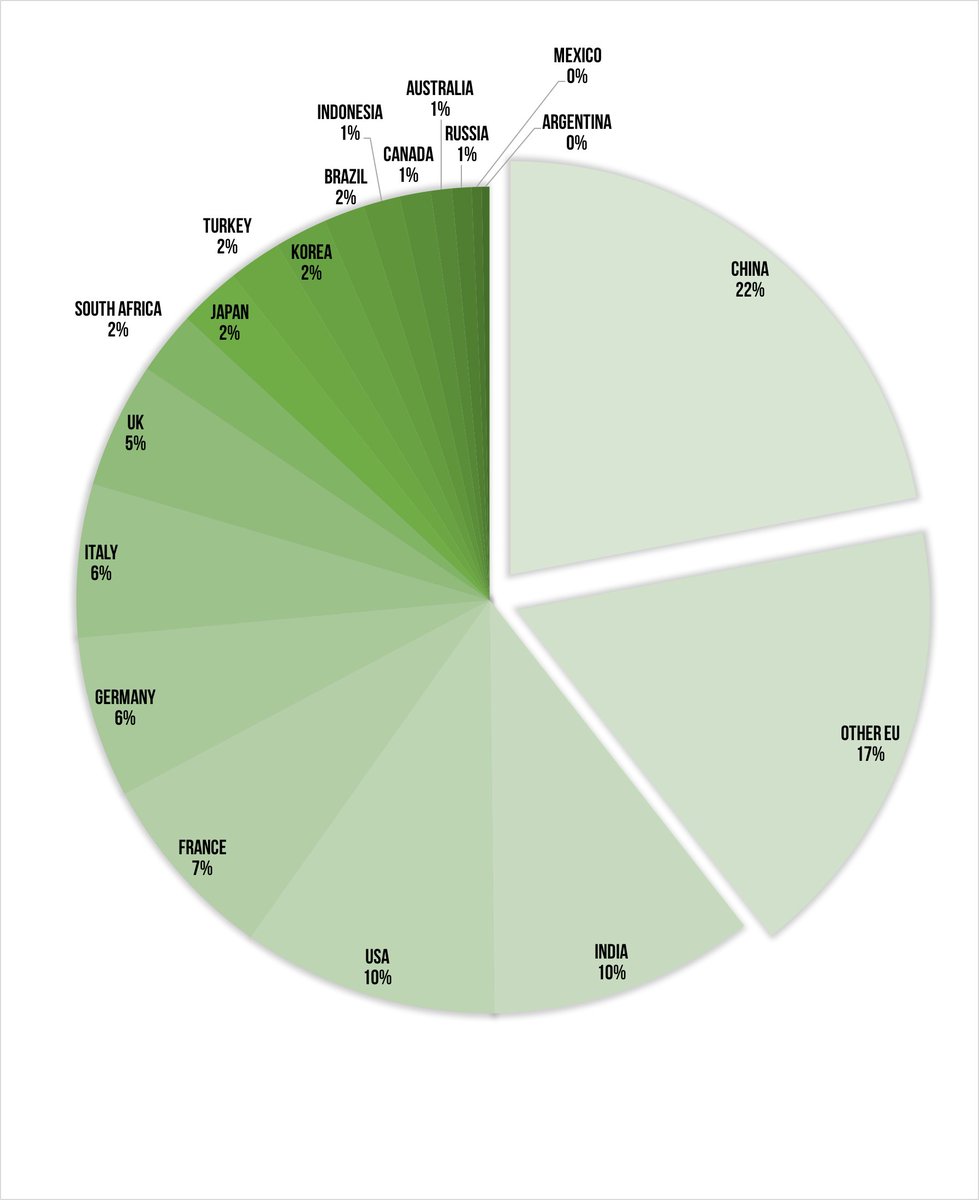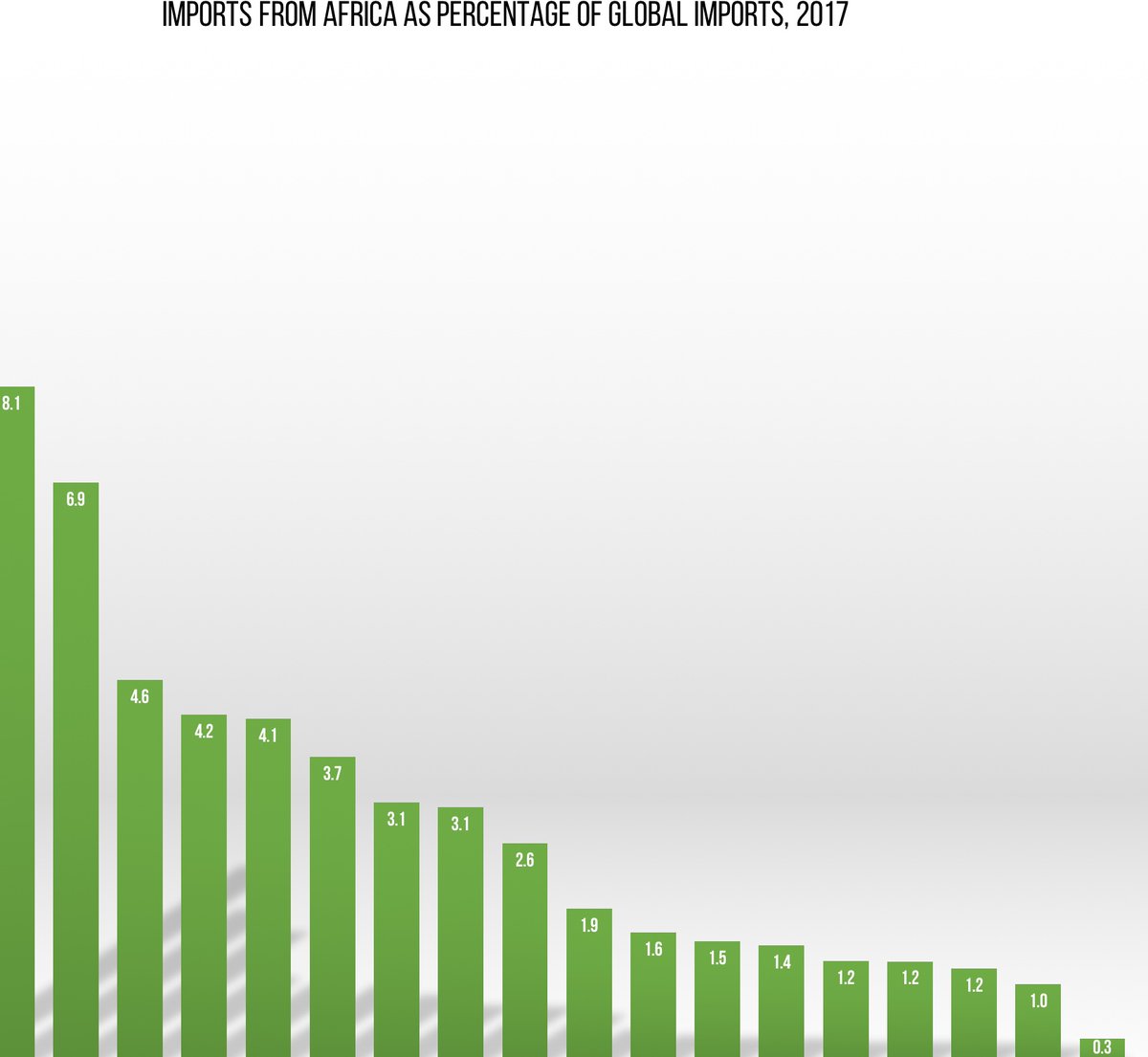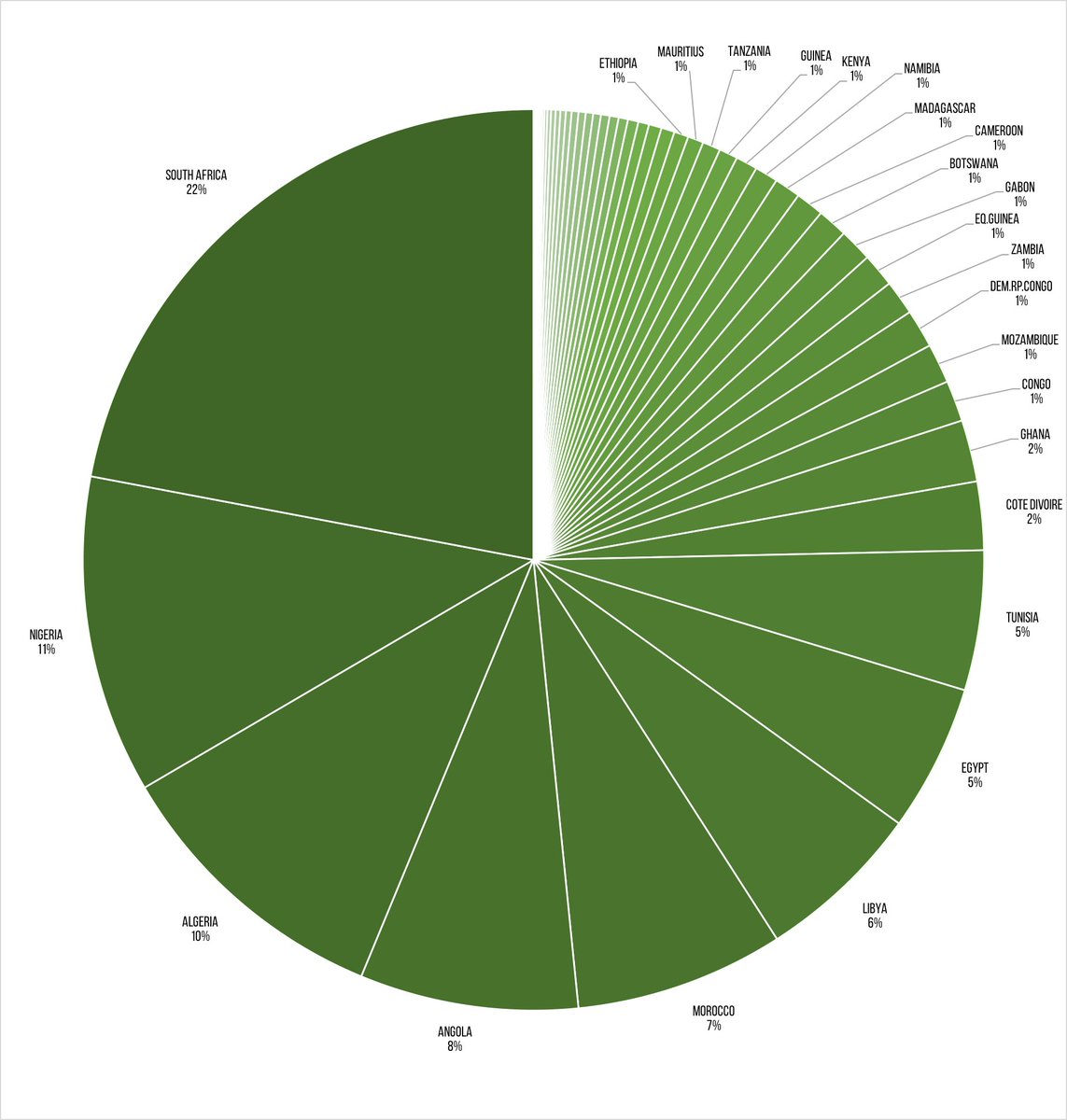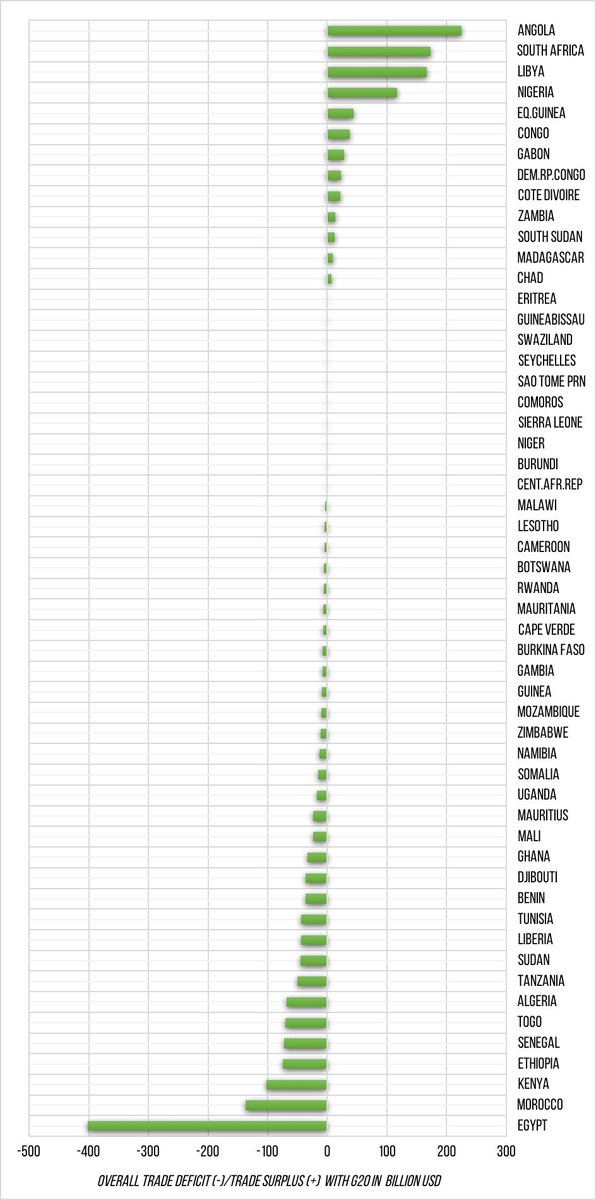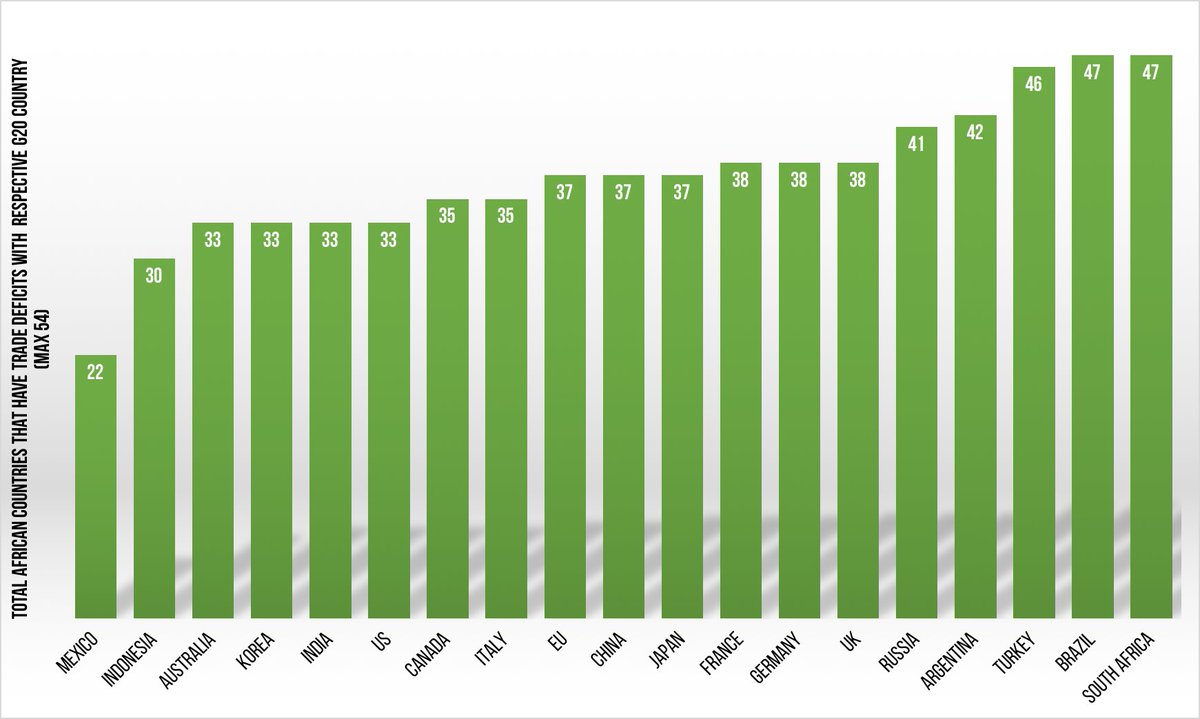#THREAD: Yesterday, we saw much attention on this #infographic on #Africa's #trade partnerships. But its oversimplistic. Here is some work we did in this area last year to help clarify what's really going on from an African, #sustainability perspective
https://twitter.com/africaupdates/status/1296104540912091141?s=20
https://twitter.com/africaupdates/status/1296104540912091141?s=20
1. Based on 2017 data (we did the following analysis in mid-2019) #China is the largest bilateral trade partner for most Africa countries, surpassed only by the #EU as a whole. China (22%) and the EU (33%) are also the largest importers of African products into the #G20  .
.
 .
.
2. But #G20  countries hardly import from #Africa. In 2017, on average just 3% of all products imported by the G20 came from Africa.
countries hardly import from #Africa. In 2017, on average just 3% of all products imported by the G20 came from Africa.
 countries hardly import from #Africa. In 2017, on average just 3% of all products imported by the G20 came from Africa.
countries hardly import from #Africa. In 2017, on average just 3% of all products imported by the G20 came from Africa.
3. This is in general, progress. Imports from African countries by most #G20  countries - incl. #China - have been growing over time, with some declines associated with commodity prices. BUT together the G20 still import 36 times more goods from outside #Africa than from within.
countries - incl. #China - have been growing over time, with some declines associated with commodity prices. BUT together the G20 still import 36 times more goods from outside #Africa than from within.
 countries - incl. #China - have been growing over time, with some declines associated with commodity prices. BUT together the G20 still import 36 times more goods from outside #Africa than from within.
countries - incl. #China - have been growing over time, with some declines associated with commodity prices. BUT together the G20 still import 36 times more goods from outside #Africa than from within.
4. If #Africa’s overall trade with #G20  is limited, it is even more limited for most African countries. 29 African countries each export less than 1% of Africa’s total to the G20, incl. #Rwanda, #Senegal. Even #Ethiopia accounts for less than 2% of Africa’s exports to the G20.
is limited, it is even more limited for most African countries. 29 African countries each export less than 1% of Africa’s total to the G20, incl. #Rwanda, #Senegal. Even #Ethiopia accounts for less than 2% of Africa’s exports to the G20.
 is limited, it is even more limited for most African countries. 29 African countries each export less than 1% of Africa’s total to the G20, incl. #Rwanda, #Senegal. Even #Ethiopia accounts for less than 2% of Africa’s exports to the G20.
is limited, it is even more limited for most African countries. 29 African countries each export less than 1% of Africa’s total to the G20, incl. #Rwanda, #Senegal. Even #Ethiopia accounts for less than 2% of Africa’s exports to the G20.
5. Only 16 African countries have a #trade surplus (i.e. export more to than import from) with 50% or more of the G20 countries. The countries that have large shares of exports to the G20 tend to have abundant oil, mineral and other natural resources (such as #Nigeria).
6. The vast majority of #African countries have an overall trade deficit with #G20  countries - #Egypt has the largest absolute trade deficit within #Africa. On average for every $1 of African exports to G20 countries, $1.4 goes back to the G20 as imports into Africa from the G20.
countries - #Egypt has the largest absolute trade deficit within #Africa. On average for every $1 of African exports to G20 countries, $1.4 goes back to the G20 as imports into Africa from the G20.
 countries - #Egypt has the largest absolute trade deficit within #Africa. On average for every $1 of African exports to G20 countries, $1.4 goes back to the G20 as imports into Africa from the G20.
countries - #Egypt has the largest absolute trade deficit within #Africa. On average for every $1 of African exports to G20 countries, $1.4 goes back to the G20 as imports into Africa from the G20.
7. The result? Of all the #G20  countries - incl. the #EU (incl. individual European countries within G20), #China, #US, ONLY #Mexico has a trade deficit (i.e. it imports more from than it exports to) with more than 50% of #African countries.
countries - incl. the #EU (incl. individual European countries within G20), #China, #US, ONLY #Mexico has a trade deficit (i.e. it imports more from than it exports to) with more than 50% of #African countries.
 countries - incl. the #EU (incl. individual European countries within G20), #China, #US, ONLY #Mexico has a trade deficit (i.e. it imports more from than it exports to) with more than 50% of #African countries.
countries - incl. the #EU (incl. individual European countries within G20), #China, #US, ONLY #Mexico has a trade deficit (i.e. it imports more from than it exports to) with more than 50% of #African countries.
8. The fact is - and despite #China - the global policy environment for #trade with #Africa has hardly shifted since before the Doha round was initiated in 2001. The #G20  have huge levers – beyond #aid – to support #Africa's #development, especially post- #COVID19. Will they?
have huge levers – beyond #aid – to support #Africa's #development, especially post- #COVID19. Will they?
 have huge levers – beyond #aid – to support #Africa's #development, especially post- #COVID19. Will they?
have huge levers – beyond #aid – to support #Africa's #development, especially post- #COVID19. Will they?
9. These challenges must keep @wto DG candidates @NOIweala @AMB_A_Mohammed & @AfCfta SG @MeneWamkele & @ECA_OFFICIAL's @SongweVera up at night. They do us too. But they are critical to address for #Africa's future. More of our analysis here. https://developmentreimagined.com/2019/06/24/is-the-g20-helping-to-increase-african-trade/

 Read on Twitter
Read on Twitter
